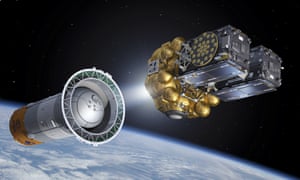This article in The Guardian reminds us of how fascinating the interrelationship of motion and mass is. You need only reconsider mass from a slightly altered perspective to see why.
Any significant mass, as in the case of a planet, or even a gravitational singularity, can be thought of, it seems to me, as simply a concentration of encapsulated motion objects. Motion and interaction within motion and interaction. The question then becomes what happens to the fabric of space time when such accumulations occur? It certainly must be related to relativistic mass or why would there also be time dilation between an observer going relatively faster than another observer; especially when the first observer approaches a significant percentage of the speed of light?
You also have to keep in mind the way we measure time in the first place, as with the number of oscillations of particular atoms. Simply more movement and interaction within what we have calculated to be the count of such regular movements within arbitrary notations of interval. It seems to me that interval in such systems really is "the space in duration," but space in tension or compression of a sort we haven't figured out quite yet. Or perhaps a consideration of space as something a great deal more complex than simply individual points in a Cartesian coordinate arrangement of more than three or four dimensions.
For me, as well as my philosophy, a reality is a vector of movement, and interaction, association, which starts from a singular reference point, creating a physical meaning space; which also has to coexist, in some fashion, with the inner meaning space of meaning processors, or sentient beings of one form or another. In this context the entirety is only one thing, with no external boundary. In essence an unbounded process of infinite potential, or infinite inner boundaries, and interactions. A reality vector creates space and interval simply because association along a vector has to be sequential by definition, and the sets of meanings (or new bits of bounded interaction) created along the way, at each arbitrary quantum moment, never go away, they simply allow for the expansion of new meanings. Space is still the one infinite thing it always has been, the only difference is between the meaning sets from quantum moment to quantum moment, along an arbitrary vector, and the limit of information transfer to keep meaning processors interactive with them.
In any case, though, this sort of new evidence serves, once again, to suggest to me that we ought to be spending more money looking into relativistic mass (away from our planet), and a lot less on bashing away at sub atomic particles with ever greater energies. We need to be out in space in a big way anyway, and there is still, in my admittedly non expert opinion, significant question as to the real efficacy, not to mention potential morality, of an approach to inquiry based on violence. The entirety will be the most complex system we will ever come up against and we simply have no right to assume that our very small inputs with colliders will not have large effects we cannot even guess at yet.

No comments:
Post a Comment